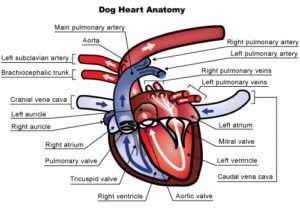Dilated cardiomyopathy (DCM) is one of the more common acquired heart diseases in dogs. DCM is a primary disease of the heart muscle in which the heart muscle (myocardium) becomes weak and so loses its ability to contract normally.
What Breeds get DCM?
There are several breeds that are predisposed to DCM. These include Doberman Pinschers, Great Danes, Irish Wolfhounds, Boxers, Newfoundlands, Portuguese Water Dogs, Dalmatians and Cocker Spaniels. But DCM is not just limited to specific breeds. It also occurs in mixed breed dogs, small dogs and more rarely in cats.
Great Danes, Irish Wolfhounds, Boxers, Newfoundlands, Portuguese Water Dogs, Dalmatians and Cocker Spaniels. But DCM is not just limited to specific breeds. It also occurs in mixed breed dogs, small dogs and more rarely in cats.
What are the Signs of DCM?
In some breeds, sudden death or fainting can occur well before any signs of CHF.
How is DCM Diagnosed?
Screening Exams for DCM
Many conscientious breeders and owners of dogs that are predisposed to DCM screen their pets for heart disease to try to minimize the risk of transmitting the disease to offspring. Screening for DCM in dogs can be expensive and complex. The screening test of choice depends on the breed of the dog and the stage of the disease.
The first step is a good physical examination. In most cases, the physical examination is completely normal. Occasionally, the veterinarian may detect an arrhythmia (abnormal heart rhythm). In Doberman Pinschers and Boxers, a 24-hour ECG recording using a 24-hour ambulatory ECG monitor (Holter monitor) is often the best way to screen dogs for early signs of DCM since an abnormal rhythm often occurs before any detectable changes in myocardial contractility. An echocardiogram (an ultrasound scan of the heart) is also used to identify dogs with DCM before they develop clinical signs, but many dogs with mild disease have equivocal findings. This examination is best performed by a board certified veterinary cardiologist.
Diagnosis in Dogs with Clinical Signs
A thorough physical examination by your veterinarian, coupled with your pet’s clinical signs and specific breed, may help make the presumptive diagnosis of DCM. Tests that help support the diagnosis are an ECG (electrocardiogram) and x-rays (radiographs) of the chest. The ECG may show an arrhythmia and/or an elevated heart rate. The chest radiographs may show an enlarged heart and/or fluid in the lung tissue or chest cavity. Some dogs may have normal chest radiographs, but have arrhythmias on their ECG. These pets may be in the early stages of DCM (see above).
In dogs with clinical signs of heart failure, an echocardiogram is necessary to confirm the diagnosis of DCM.
How is DCM Treated?
Treatment of heart failure is based each individual patient. Drugs commonly used are diuretics (most commonly furosemide or better known as Lasix), ACE inhibitors that relax the vasculature, and pimobendan, which helps the strength of contraction of the heart muscles and dialates the blood vessels. .
If you’re worried that your animal companion might have DCM, Urban Animal can help! Call us today to make an appointment.
Houston Heights Top Rated Vet Clinic
Urban Animal Veterinary Hospital
1327 Yale St
Houston, TX 77008
(713) 863-0088


